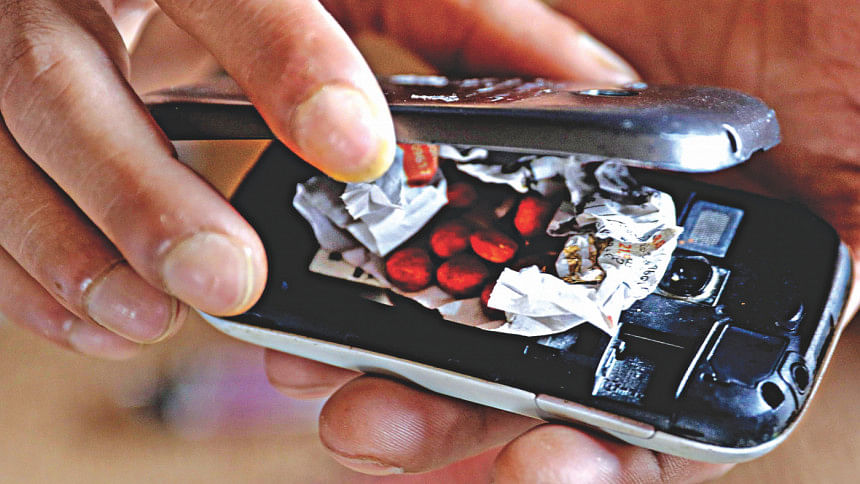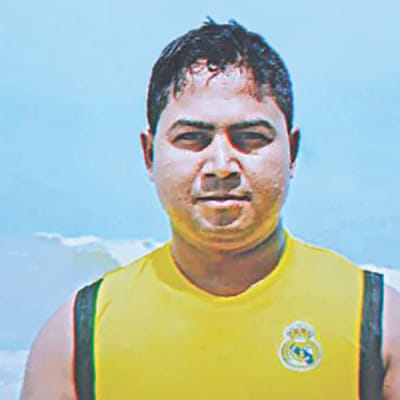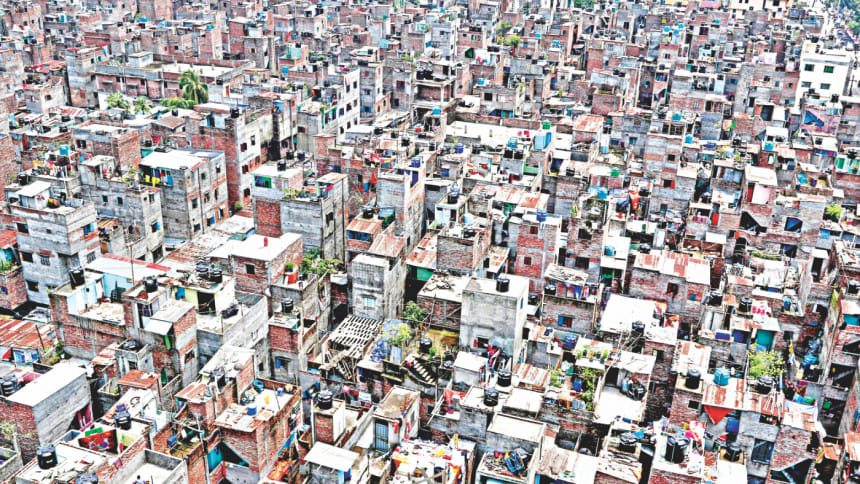Mohammadpur Geneva camp: Exiled yaba lord reclaims throne


He is back.
Ishtiaq Ahmed, known as the drug lord of Mohammadpur Geneva Camp, was forced to stay out of his empire after the anti-narcotics crackdown began in 2018.
But he reclaimed the throne this year, thanks to some unscrupulous law enforcement officials, and a top underworld criminal who had got life term but came out of jail recently, said intelligence and camp sources.
Ishtiaq first appeared on the scene in 2006. It was initially a gang of six but more people eventually joined him, and by 2015, he led a gang of 250.
After the countrywide drives began in May 2018, he took shelter in "safe houses" in different Asian countries, including Malaysia, Thailand and Vietnam, and back home, dozens of his gang members got arrested, according to law enforcement sources.
Finally, he returned to the country early last month on "green signal from his network", they said.
Now believed to be running the show from India, the 36-year-old has reorganised his gang with around 150 members including women and children who directly take part in retail sales of yaba.
The Daily Star got this picture after a three-week investigation. These correspondents talked to people who work for Ishtiaq, local sources and members of different law enforcement agencies.
THE RACKET
A ragpicker 20 years back, Ishtiaq now controls the yaba supplies in Mohammadpur, Gabtoli, Aminbazar, Beribadh, Hemayetpur and Ashulia.
His gang has adopted a new model of yaba trade and only sells the pills to trusted buyers and prefers online order and payment.
A member of Ishtiaq's gang sells minimum 50 and maximum 500 pink pills a day at Tk 250 to Tk 300 each in Mohammadpur. He or she gets Tk 2,000 to Tk 5,000 as commission, depending on the sale.
According to law enforcement sources, Molla Arshad, Ishtiaq's second-in-command, mostly takes care of the narcotics network.
Born in Saidpur, Arshad is a childhood friend of Ishtiaq. Both grew up in the Geneva Camp, a densely-populated settlement of more than 25,000 Urdu-speaking Biharis.
Once the driver of a doctor in Mohammadpur, he teamed up with Ishtiaq in 2011. The gang reached its peak after 2015 when the Geneva Camp became a hotbed for the mad drug. Nadim aka Pachish was Ishtiaq's second-in-command back then.
Arshad took the charge after Nadim was killed in a "gunfight" with Rab in July 2018. He was arrested with 60,000 pieces of yaba tablets in March that year but came out on bail just in 21 days.

HIS PROPERTY
Ishtiaq has over 100 bighas of land in Savar and Ashulia, where most people know him as Kamrul Islam, according to an investigation report of a law enforcement agency. He buys land from the needy by paying them high prices, said locals.
Ishtiaq and his wife Pakhi own two buildings in Ashulia. Around Tk 3 lakh is collected as monthly rent from the two buildings.
Sahab Uddin, caretaker of one of the buildings, said Pakhi used to live here with three sons in this building two years back but none of his family members come anymore.
Asked about Isthiaq's whereabouts, Sahab said they hand over the rent to their manager Ibrahim every month. "We have heard that Ibrahim sends the money to India, where he [Ishtiaq] is living now."
The Daily Star rang Ibrahim's mobile phone dozens of times but he did not answer.
A high official of the Department of Narcotics Control said on January 27 that they have submitted their report to the Anti-Corruption Commission regarding Ishtiaq's property and the ACC already registered a complaint.
The ACC on November 11 last year filed two cases against Ishtiaq and his wife Pakhi on charges of amassing illegal wealth and not submitting their wealth statement.
Regarding the latest updates, an ACC official told The Daily Star on January 28 that the cases are still under investigation. They have no updates to disclose yet, he added.
A high official of an intelligence agency, who is watching Ishtiaq's movement for the last two years, also confirmed to this newspaper that the drug lord is hiding in India now.
"We have got some clue about his activities and trying to pinpoint the precise location."
Khorshid Alam, assistant director of DNC, who is taking care of Ishtiaq's cases, told The Daily Star on January 27 that they are on alert and always checking updates on Ishtiaq and his gang members.
BACKING OF POLICE
According to sources, Ishtiaq's men give Tk 8-10 thousand to some officers at Mohammadpur Police Station every night and Tk 75 thousand to detectives every week to run the business without hassle.
Tanvir Adnan, an advisor to Ishtiaq, acts as liaison with police.
Since the very beginning, some unscrupulous police officials are protecting the drug lord in exchange for hefty amount of money. He is also backed by a number of local ward councillors linked to some ruling party leaders.
Locals alleged that whenever they handed over Ishtiaq's accomplices to police, officers brought weak charges showing a small recovery of drugs, helping them get bail in a short time.
On September 23 last year, a section of camp dwellers wrote to the home ministry and Police Headquarters naming three officials of Mohammadpur Police Station -- sub-inspectors Sajib Koch, Apurba Barman and Md Hasan.
Sajib, who is still the beat-in-charge of Geneva Camp area, allegedly receives certain amount of money from narcotic dealers in the camp through his informants.
Talking to The Daily Star on January 25, he brushed off the allegation and said drug dealers are spreading propaganda to malign him. "We have arrested many drug dealers at the camp. They are doing this to keep pressure on us."
There are allegations against the police personnel that they run drug business at the camp using police informants.
In November last year, Sajib's informant Kalim Jambu was arrested by the Detective Branch with 50 grams of heroin.
Asked about it, the official said, "Most of the informants are bad people. What Kalim did was not my responsibility."
He admitted that the drug business in the camp is still going on but the peddlers are using new strategies. "Earlier, they used to keep drugs inside camps. Now they keep those at the flats adjacent to the camp area."
On an average, 150 cases are filed with Mohammadpur Police Station per month, he said, adding that half of those are narcotics cases related to Geneva Camp area.
Contacted, SI Apurba Barman and SI Hasan made similar comments over the allegations against them.
Regarding action, a high official at the Police Headquarters, told The Daily Star that they investigate every complaint they receive and take action only after getting valid evidence.
Locals also alleged that the drug business in the camp is run by the nexus of police and narco bosses including Ishtiaq, Arshad, Golam Zilani alias Kana Zilani and Shakil alias Ganja Shakil.
This newspaper could not contact any of them.
DNCC ward-32 councillor Habibur Rahman Mizan, widely known as Pagla Mizan, and ward-33 councillor Tarequzzaman Rajib backed these drug kingpins, according to the law enforcers.
Both the councillors have been arrested in recent anti-graft drives and they are still behind bars.
There is an allegation that Rajib used to "manage" some top ruling party leaders for smooth operation of the narcotics business. His aide Imran Hossain, one of the top yaba dealers in Mohammadpur, was arrested in November last year with 11,000 contraband pills.
Asked about Ishtiaq's gang, Abdul Latif, officer-in-charge of Mohammadpur Police Station, told this newspaper that he couldn't say much as he joined the station recently.
About the allegation against the police officials, he said, "Allegations were raised against the very officers who were the most active and arrested a big number of drug peddlers in the area. All the allegations are not true."
He said the duty areas of the officers have been changed.
However, one of them is still assigned to the Geneva Camp even after a complaint against him was filed with the Police Headquarters in September last year. The man who lodged the complaint, had to leave the camp fearing reprisal, according to local sources.
Masudur Rahman, deputy commissioner (media) of Dhaka Metropolitan Police (DMP), told The Daily Star that police are working against drug trade with zero-tolerance policy.
Asked about involvement of some police officials, Masudur said, "If anyone files any specific allegation, we will investigate and take action."
BUSINESS IS GOOD
Two years into the "War on Drugs", which claimed over 400 lives, there is no dearth in supply and availability of yaba. According to police intelligence, over 90,000 pills are sold daily in Mohammadpur area alone.
According to drug users, the business of Geneva Camp now has expanded to its nearby safer places. The dealers are more careful now, they don't sell it in their own area and verify the customers before meeting them.
The entrance road of Shaheed Suhrawardy Medical College & Hospital, Town Hall Bazar, Banshbari slum and a few roads near the Geneva Camp are safe zones where dealers deliver yaba pills to the customers.
Generally, the drug dealers prefer crowded place like restaurant forefront, hospital area to avoid suspicion.
"Deals are all done over phone. Even you can pay it through mobile transaction. When you go to the place, s/he will hand over the pills to you and leave the place immediately without any talk," said a drug user, who now buys yaba pills from Town Hall bazar area.
The drug users also said there is a change in quality now. Quality varies from dealer to dealer, place to place.
"Earlier there were three to four types of pills. Now there are more variations but the quality is down. Earlier there were symbols like RX and WY written on the pills. Now there is no such symbol on a pill; it's all plain," said another user, who has been taking yaba for the last five years.
According to the Department of Narcotics Control, around 3.10 crore yaba tablets were seized in 2019 despite major crackdowns by the law enforcement agencies.
The Border Guard Bangladesh seized 13,13,218 pills across the country in last two months, and 2,84,610 pieces worth over Tk 8 crore in Teknaf early Saturday alone.
Intelligence sources said previously yaba tablets were smuggled into Bangladesh mostly through the Myanmar border in large quantities. Now they are opting for new routes and strategies, adding Indian border and bringing in smaller consignments.
[Our Savar correspondent Akhlakur Rahman Akash contributed to this report]



 For all latest news, follow The Daily Star's Google News channel.
For all latest news, follow The Daily Star's Google News channel. 



Comments